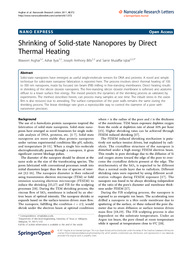
ATTENTION: The works hosted here are being migrated to a new repository that will consolidate resources, improve discoverability, and better show UTA's research impact on the global community. We will update authors as the migration progresses. Please see MavMatrix for more information.
Show simple item record
| dc.contributor.author | Iqbal, Samir M. | |
| dc.contributor.author | Asghar, Waseem | |
| dc.contributor.author | Billo, Joseph A. | |
| dc.contributor.author | Ilyas, Azhar | |
| dc.date.accessioned | 2013-02-13T19:53:23Z | |
| dc.date.available | 2013-02-13T19:53:23Z | |
| dc.date.issued | 2011-05-04 | |
| dc.identifier.citation | Published in Nanoscale Research Letters, 2011. 6(1): p. 372 | en_US |
| dc.identifier.uri | http://hdl.handle.net/10106/11310 | |
| dc.description.abstract | Solid-state nanopores have emerged as useful single-molecule sensors for DNA and proteins. A novel and simple technique for solid-state nanopore fabrication is reported here. The process involves direct thermal heating of 100 to 300 nm nanopores, made by focused ion beam (FIB) milling in free-standing membranes. Direct heating results in shrinking of the silicon dioxide nanopores. The free-standing silicon dioxide membrane is softened and adatoms diffuse to a lower surface free energy. The model predicts the dynamics of the shrinking process as validated by experiments. The method described herein, can process many samples at one time. The inbuilt stress in the oxide film is also reduced due to annealing. The surface composition of the pore walls remains the same during the shrinking process. The linear shrinkage rate gives a reproducible way to control the diameter of a pore with nanometer precision. | en_US |
| dc.language.iso | en_US | en_US |
| dc.publisher | Asghar et al;SpringerOpen; | en_US |
| dc.subject | Nanopores | en_US |
| dc.subject | Nanotechnology | en_US |
| dc.subject | Molecular medicine | en_US |
| dc.title | Shrinking of Solid-state Nanopores by Direct Thermal Heating | en_US |
| dc.type | Article | en_US |
| dc.publisher.department | Department of Electrical Engineering, University of Texas at Arlington, Arlington | en |
| dc.identifier.externalLink | https://www.uta.edu/ra/real/editprofile.php?pid=1933&onlyview=1# | en_US |
| dc.identifier.externalLinkDescription | Link to Research Profiles | en_US |
Files in this item
- Name:
- 1556-276X-6-372.pdf
- Size:
- 1.148Mb
- Format:
- PDF
- Description:
- PDF
This item appears in the following Collection(s)
Show simple item record


